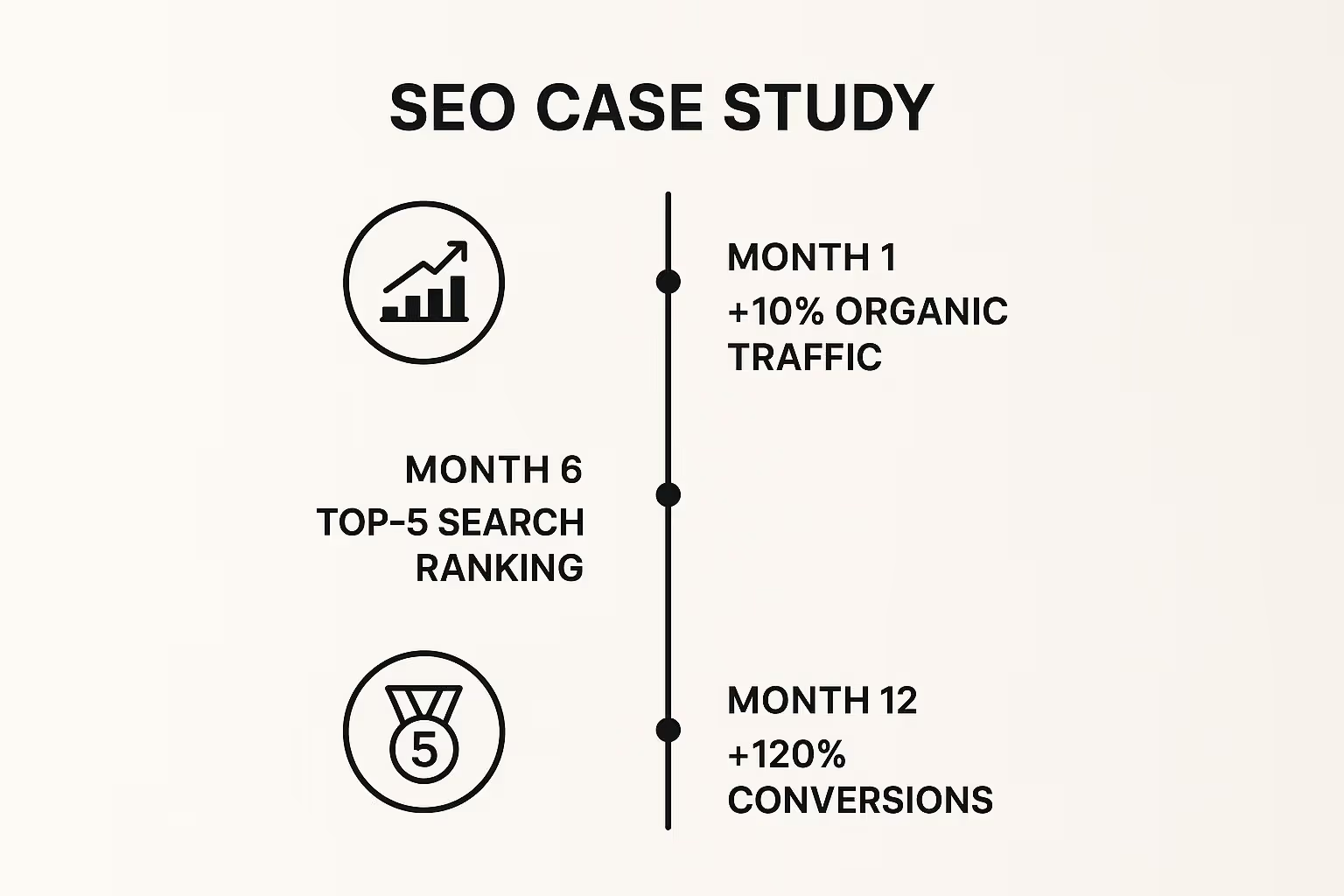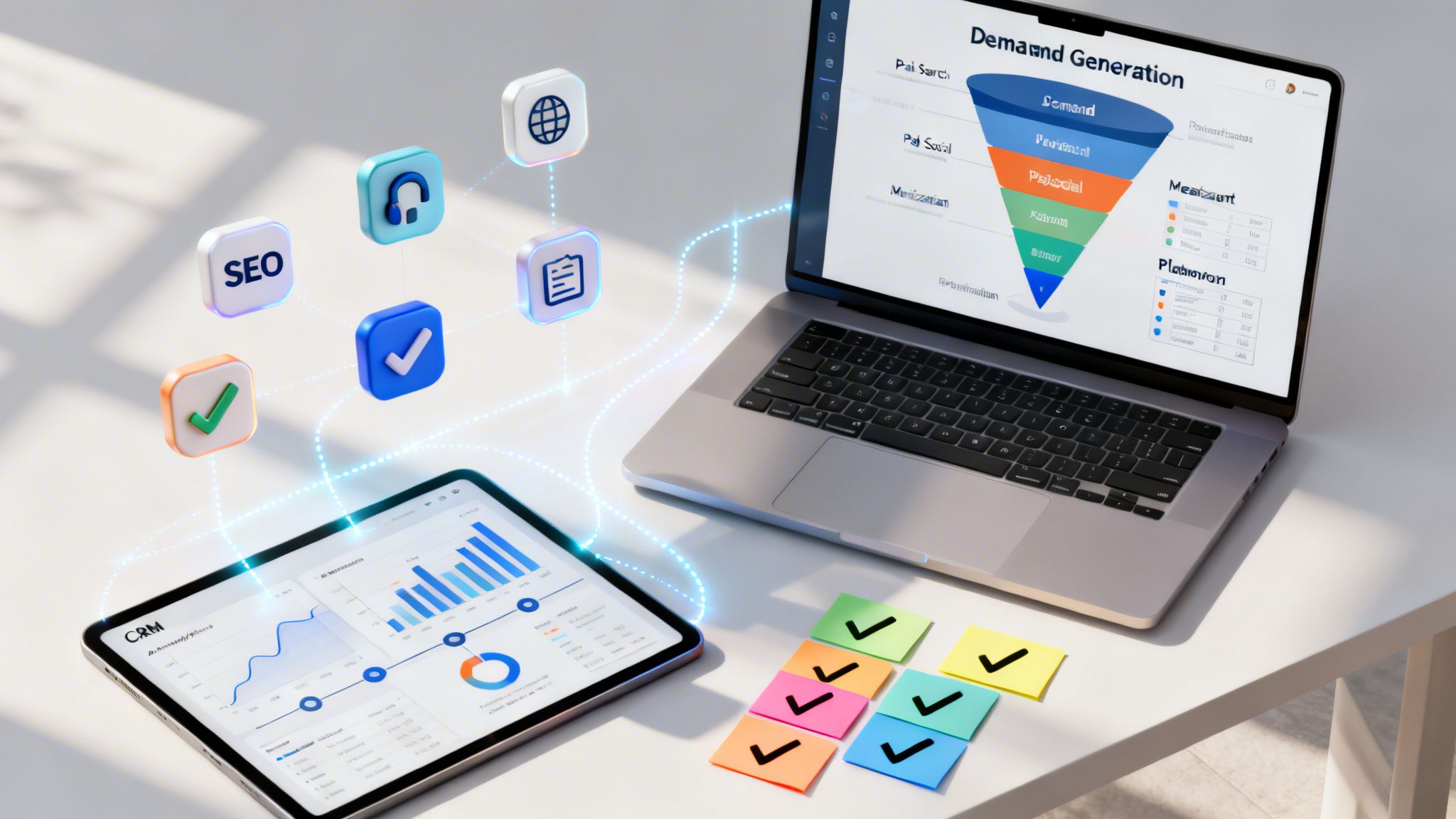For most businesses with a long-term vision, asking "is SEO worth it" almost always gets a resounding "yes." The key is to shift your perspective: SEO isn't just a marketing expense; it's an investment in a valuable digital asset.
Think of it this way: SEO is like buying and developing a piece of digital real estate. Unlike paid ads—which are like renting a billboard that disappears the moment you stop paying—a strong organic presence consistently generates traffic, leads, and authority for your brand.
The Bottom Line on SEO Value

So, what is SEO, really? It's the strategic process of optimizing your website to be more visible when people search for your products or services online. When your ideal customer types a problem you can solve into Google, SEO ensures your business appears as a credible solution.
It’s the digital equivalent of establishing a flagship store in a prime location. You attract a steady stream of potential customers without paying for every single person who looks in the window.
Paid ads offer immediate visibility, but they operate on a pay-to-play model. The moment you stop spending, your traffic vanishes. SEO, on the other hand, builds lasting equity. The content you create and the authority you earn today can continue attracting qualified leads for months, or even years, delivering a sustainable return on that initial investment.
When Does SEO Deliver Peak Value?
The "worth" of SEO isn't one-size-fits-all. Its value is a direct result of your industry, patience, and strategic investment. For B2B companies and professional services with long sales cycles and high-value clients, it’s an undeniable powerhouse.
Why? Because over 70% of B2B buyers begin their purchasing journey with a generic search. They are researching solutions long before they consider contacting a sales representative. If you’re not visible during this critical discovery phase, you’re effectively invisible to a significant portion of your market.
SEO is about earning trust at scale. By consistently providing valuable answers to your audience's questions, you build brand authority that paid ads simply cannot buy. This trust becomes a significant competitive advantage over time.
To fully grasp the strategic imperative, our guide on why SEO is important for business growth is an excellent resource. Understanding this foundation is key to appreciating the long-term financial payoff.
Quick Guide to Evaluating SEO's Worth for Your Business
To help you quickly gauge if SEO is the right move for your business, this table breaks down the scenarios where it typically delivers the most value—and when it might not be the best fit. Consider this a starting point for a deeper analysis.
ConsiderationHigh SEO Value ScenarioLower SEO Value ScenarioBusiness ModelHigh-value products/services, long customer research phase (e.g., B2B SaaS, Legal Services)Low-margin, impulse-buy products with no search demandTimeline for ResultsBusinesses with a 12+ month strategic growth planCompanies needing immediate sales within the next 30 daysMarket CompetitionEstablished markets with clear search demand and identifiable competitorsBrand-new product categories where nobody is searching for a solution yetCustomer AcquisitionGoal is to build a sustainable, low-cost lead generation engine for the long termReliant on short-term promotions and event-driven marketing spikes
Ultimately, the decision hinges on whether you're building a brand for tomorrow or just trying to hit next month's sales target. For sustainable, long-term growth, the value is almost always there.
Deconstructing the Real Costs of SEO

To get a straight answer to "is SEO worth it," we must first discuss what it actually costs. The price of SEO isn’t a simple line item—it’s a strategic investment in building a permanent, valuable asset for your business.
Paid advertising is like renting a pop-up shop in a busy mall. You get immediate foot traffic, but the second you stop paying rent, your shop vanishes. SEO, conversely, is like buying the land and building your own flagship store in a prime location. It requires more time and a larger upfront investment, but once established, it generates organic traffic for years, building real equity.
This fundamental distinction is crucial for budgeting. You aren't just buying clicks for the month; you're investing in digital real estate that should appreciate over time.
Breaking Down SEO Investment Models
The cost of a robust SEO program can vary significantly depending on your goals, industry competitiveness, and the engagement model you choose. Generally, there are three primary approaches, each with distinct advantages and disadvantages.
Here’s how they typically stack up:
- Agency Retainers: The preferred choice for most businesses seeking a comprehensive, "done-for-you" solution. You pay a monthly fee, and the agency manages everything from technical audits and content creation to link building and reporting.
- In-House Teams: Larger organizations often build their own SEO teams. This offers maximum control and seamless integration with other departments but comes with the highest fixed costs, including salaries, benefits, and tool subscriptions.
- Freelance Consultants: Hiring a freelancer is a flexible option for specific, targeted projects, such as a one-off site audit or a focused link-building campaign. It's often more affordable than an agency but may lack the same breadth of services.
Understanding these models is the first step in aligning your budget with the level of support your business needs to succeed.
What Your SEO Budget Actually Buys
So, what are you really paying for? A serious SEO investment covers a spectrum of specialized activities that must work in concert to improve your visibility and drive qualified traffic. The price tag directly reflects the scope and intensity of that work.
A well-funded SEO campaign isn't about "buying rankings." It's an investment in the strategic creation of high-quality content, the technical perfection of your website, and the cultivation of genuine authority within your industry.
Let's break down what you can realistically expect at different investment levels.
Investment LevelTypical Monthly Cost (Agency)What It Generally IncludesFoundational SEO$1,500 – $4,000Basic keyword research, on-page optimization, local SEO, and essential technical fixes. Good for small businesses in low-competition markets.Professional Growth$4,000 – $10,000Comprehensive content strategy, consistent high-quality blog production, foundational link building, and detailed performance reporting. Ideal for growing B2B and service-based businesses.Enterprise & Competitive$10,000+Aggressive content creation, advanced technical SEO, authoritative digital PR and link acquisition, and in-depth competitor analysis. Necessary for national or highly competitive industries.
These are not arbitrary figures. The investment directly funds the time, tools, and expertise needed to create a real competitive advantage. For example, a larger budget allows for producing more in-depth, authoritative content, using premium SEO software like Ahrefs or Semrush for deeper analysis, and executing ambitious outreach campaigns to earn high-authority backlinks that truly move the needle.
Ultimately, the cost of SEO reflects the value you aim to create. It’s an investment in becoming the go-to authority in your space, ensuring that when your ideal customers search for solutions, your business is the one they find.
Measuring the True ROI of Your SEO Efforts

To definitively answer the question "is SEO worth it," you must look beyond vanity metrics. While seeing your website traffic spike is encouraging, it doesn't directly impact your bottom line. The real proof is in the return on investment (ROI)—a tangible number that connects every dollar you spend to the revenue it generates.
Calculating SEO ROI isn't a dark art; it's straightforward business mathematics. At its core, the formula is universal, whether you’re purchasing new equipment or launching a marketing campaign.
The Essential SEO ROI Formula:
(Gain from Investment – Cost of Investment) / Cost of Investment
This simple calculation transforms your SEO efforts from an abstract "marketing expense" into a measurable performance driver. It provides the clear, data-backed proof needed to justify budgets and demonstrate value to stakeholders focused on profit and loss.
Defining Your Gain From Investment
The "Gain" in your ROI calculation must be tied to actual business outcomes. It’s about translating organic traffic into revenue. While every business model is different, the key performance indicators are nearly always the same.
Here’s how you can assign a dollar value to your gains:
- Qualified Leads: Track high-quality leads generated directly from organic search. These are the individuals filling out contact forms, requesting demos, or calling after finding you on Google.
- Conversion Value: Assign a monetary value to each conversion. For an e-commerce site, this is your average order value. For a service-based business, it might be the average value of a new client contract.
- Customer Lifetime Value (CLV): This is the ultimate metric. By calculating the total revenue a new customer is likely to generate over their entire relationship with your business, you begin to see the incredible long-term impact of acquiring them through SEO.
Focusing on these numbers allows you to draw a direct line from your SEO activities to your bottom line. Analytics can show you precisely how many people who found you through a specific keyword became paying customers. For online stores, mastering this process is paramount; our detailed guide on ecommerce SEO shows how visibility increases sales.
Factoring in the Invisible Returns
The standard ROI formula only tells part of the story. A significant portion of SEO's value comes from intangible assets that build a competitive moat around your business. While harder to quantify on a spreadsheet, these "invisible returns" are what separate market leaders from the competition.
These crucial gains include:
- Enhanced Brand Authority: Consistently appearing at the top of search results for important industry terms establishes you as the trusted expert, which can streamline sales cycles.
- Increased Market Trust: People inherently trust organic search results more than paid ads. This earned trust leads directly to higher engagement and better conversion rates.
- Greater Share of Voice: Dominating search results for your core topics means your brand owns the conversation in your market. You're not just participating; you're leading.
These qualitative benefits compound over time, creating a powerful flywheel effect. The more authority you build, the easier it becomes to rank for new keywords, which in turn builds even more authority.
Benchmarking Your Potential ROI
The financial impact of a well-executed strategy is substantial. Data consistently shows that when it comes to pure financial return, SEO outperforms most other marketing channels.
Across various industries, SEO generates an average ROI of 825%. This means for every $1 invested, businesses typically see $8.25 in return. Why? Because leads from organic search convert at a staggering 14.6%, compared to just 1.7% for traditional outbound marketing.
This efficiency also reduces costs. On average, SEO cuts lead acquisition expenses by 61% compared to outbound methods.
Ultimately, measuring the true ROI of SEO involves a combination of tracking hard financial data and appreciating its long-term, brand-building power. By monitoring the right metrics and understanding the compounding value of your digital authority, you can build an undeniable business case for your investment.
Setting Realistic Timelines for SEO Success
Let's address one of the biggest challenges in answering the "is SEO worth it" question: impatience.
Unlike paid ads, which provide an instant (and costly) surge of traffic, SEO is a marathon, not a sprint. Without understanding the timeline, you risk becoming frustrated and abandoning the strategy just before it yields significant results. Managing expectations from day one is critical for securing the long-term commitment SEO requires.
Think of it like planting a tree. You don't put a seed in the ground on Monday and expect a mature oak by Friday. First, you prepare the soil (technical audit). Then, the seed needs time to germinate beneath the surface (foundational work). Finally, it begins to grow—slowly at first, but steadily into a strong, resilient asset that provides value for years. SEO works in precisely the same way.
This visual breaks down the key milestones you can expect on a typical SEO journey, illustrating how initial, seemingly small efforts compound into major results over a year.

As you can see, early increases in traffic often precede significant ranking improvements. Those rankings then drive a substantial lift in conversions once sufficient trust and authority have been established with Google.
Phase 1: The Foundational Phase (Months 1-3)
The first three months are dedicated to building a rock-solid foundation. This crucial, behind-the-scenes work sets the stage for all future progress. During this period, you won’t see a massive surge in traffic, which is completely normal and expected.
Here’s what’s happening under the hood:
- Comprehensive Audits: A deep dive into your website's technical health, content quality, and backlink profile to identify and prioritize issues that are hindering performance.
- Strategic Planning: In-depth keyword research and competitor analysis to create a content roadmap aligned with your business goals, not just vanity metrics.
- Technical Fixes: Resolving core problems like site speed, mobile-friendliness, and crawlability so that search engines can properly find and index your site.
Think of this as laying the foundation and framing for a skyscraper. It’s not the most glamorous part of the project, but without it, the entire structure would be unstable.
Phase 2: The Growth Phase (Months 4-12)
With the foundation in place, the visible work begins to gain traction. The focus shifts to executing the strategy: creating high-quality content and building your site’s authority. This is when you'll start to see and feel measurable momentum.
Your organic traffic will begin a steady upward climb, and you'll notice your target keywords appearing on the first few pages of Google. This isn't luck; it's the direct result of consistent content creation and strategic link-building efforts taking root.
This is the phase where patience truly pays off. The compounding effect of SEO kicks in here. Every new blog post and every earned backlink adds another layer to your digital authority, making future gains easier to achieve.
Phase 3: The Authority Phase (Year 2 and Beyond)
After a year of consistent, strategic effort, the real impact becomes apparent. You've built a powerful engine fueled by high-quality content and authoritative backlinks. In this phase, your results begin to compound significantly.
You're no longer just ranking for a handful of keywords; you’re starting to dominate your niche. This is where SEO’s true value becomes undeniable. For many businesses, organic search becomes their primary—or even top—source of qualified leads and revenue.
This compounding effect is particularly powerful in competitive sectors like e-commerce. An extensive study revealed that while e-commerce sites see a modest 0.8x ROI in the first six months, that figure jumps to an impressive 2.6x by the 12-month mark. By 18 months, with authority cemented, the ROI climbs to 3.8x, eventually stabilizing at over 5x after three years of sustained effort. You can explore the full e-commerce SEO ROI report for a closer look at the data.
How SEO Value Differs Across Industries
Answering "is SEO worth it" without considering your specific industry is like asking if a boat is a good investment. It depends entirely on whether you're fishing in a small pond or crossing an ocean. The potential payoff can vary dramatically across different markets.
For a B2B SaaS company, a single new client might represent a $50,000 annual contract. For a local restaurant, a new customer might be a $20 lunch order. Both are valuable, but the economics of acquiring them are fundamentally different. This is why a one-size-fits-all approach to SEO is ineffective.
The real value of SEO is directly tied to your business's core metrics: average customer lifetime value (CLV), the length of your sales cycle, and the amount of research your buyers conduct before making a purchase.
High-Return Industries and What They Have in Common
Some sectors are practically built for massive SEO returns. These are typically industries where a single new customer or client is worth thousands—or even hundreds of thousands—of dollars. When the stakes are this high, a significant upfront investment in a long-term SEO strategy isn't just justified; it's a strategic necessity.
Consider markets like financial services, specialized legal practices, or high-end real estate. The sales cycle is long and built on research and trust. People don't make snap decisions about their life savings or multi-million dollar property deals. They spend weeks, sometimes months, evaluating options and searching for credible experts.
For businesses in these high-consideration industries, SEO isn't just another marketing channel—it's a core part of the sales process. It’s how you build the authority and trust needed to attract, nurture, and convert high-value clients who are actively looking for the solutions you provide.
This is where organic search becomes incredibly powerful. By ranking for the key questions and commercial terms your prospects use, you position your brand as the go-to authority. You capture leads at the beginning of their journey, building a pipeline of educated, high-intent prospects who are already confident in your expertise before ever speaking to a salesperson.
Markets with Different ROI Trajectories
Conversely, some industries have a more challenging path to a clear financial return from SEO. A low-margin e-commerce business, for instance, will struggle to outrank giants like Amazon for broad product keywords. Their success often depends on identifying and dominating a very specific, underserved niche.
Similarly, a business that relies on impulse buys, like a food truck, will likely achieve faster results from hyperlocal SEO efforts and a well-maintained Google Business Profile than from a broad national content strategy. The investment must align with the potential return of a single transaction.
The key is to align your SEO investment with the economic realities of your market. Real-world benchmarks are crucial for setting expectations. Recent industry-specific data reveals significant variations in returns, but many sectors see surprisingly quick break-even times and incredible long-term growth.
For example, real estate stands out with an average ROI of 1,389% and a break-even point of just 13 months, showcasing how high-value transactions can turn organic leads into massive revenue. Other high-performers include medical devices, financial services, and higher education, with ROIs of 1,183%, 1,031%, and 994%, respectively, all reaching profitability within 9 to 13 months. B2B SaaS follows with a 702% ROI and a 7-month break-even, while local services like HVAC can achieve a 678% ROI and break even in as little as 6 months. You can explore these figures and more in these comprehensive SEO statistics on ExplodingTopics.com.
SEO ROI Benchmarks by Industry
To help ground your expectations in reality, here is a snapshot of typical SEO performance across several key industries. Use these numbers as a starting point to gauge how your market landscape might shape your own SEO journey.
IndustryAverage ROITypical Break-Even Timeline (Months)Real Estate1,389%13Medical Devices1,183%9Financial Services1,031%11Higher Education994%12B2B SaaS702%7HVAC Services678%6
These benchmarks reveal a clear pattern: the higher the value of a single conversion, the more powerful SEO becomes as a long-term growth engine. By understanding where your industry falls on this spectrum, you can confidently decide if SEO is the right investment for you.
Common Questions About SEO Value
Even after analyzing the costs, timelines, and potential returns, it's normal to have lingering questions. Answering "is SEO worth it?" often involves addressing the practical concerns that arise during internal discussions.
Committing to SEO is a major decision. Let's walk through some of the most common—and critical—questions to help you gain clarity on the investment.
Can I Just Do SEO Myself?
The DIY route is tempting, especially when trying to manage costs. For a very small local business in a non-competitive market, learning the basics of on-page SEO and maintaining a Google Business Profile might suffice.
However, for most businesses, especially in competitive B2B or professional services sectors, the complexity is on another level.
Modern SEO is a multifaceted discipline that combines technical expertise, sophisticated content strategy, and authoritative link building—skills that take years to master. When you hire an expert, you're not just saving time; you're investing in a professional who can navigate the complexities and avoid costly mistakes that could lead to Google penalties or derail your progress. To understand the potential pitfalls, see our guide on the biggest SEO mistakes to avoid.
Think of it like home repairs. You might fix a leaky faucet with a YouTube video, but you wouldn't attempt to re-pipe the entire house. The risk and complexity are too high.
Is SEO Better Than Paid Ads?
This isn't an "either/or" question. It’s about using the right tool for the right job. SEO and paid ads are different marketing levers that work best in tandem.
- Paid Ads (like Google Ads): This is like turning on a faucet for instant traffic and leads. It's excellent for launching a new product, running a promotion, or testing a market. The catch? The moment you stop paying, the flow stops.
- SEO: This is like digging a well. It requires a significant upfront investment of time and resources. But once established, it provides a steady, sustainable flow of highly qualified traffic that continues long after the initial investment.
In the long run, SEO almost always delivers a higher ROI and a lower customer acquisition cost (CAC) because you are building a durable digital asset—your website's authority—that generates value for years.
What Are the Biggest Risks in SEO?
Like any major business investment, SEO is not without risks. However, the most common dangers are manageable with a strategic approach and due diligence.
The biggest risk in SEO isn't that it might not work. It's investing in a strategy that isn't tied to real business outcomes, leaving you with more traffic but no more revenue.
Here are the main potential pitfalls:
- Choosing the Wrong Partner: The single greatest danger is hiring someone who uses unethical "black-hat" tactics. Practices like buying links or keyword stuffing may offer a short-term boost but inevitably lead to severe Google penalties that are difficult to recover from.
- Impatience and Unrealistic Timelines: SEO is a long-term strategy. It often takes 6-12 months to see results that significantly impact the bottom line. Pulling the plug too early guarantees that your investment will be wasted.
- No Connection to Business Goals: If your SEO efforts are not laser-focused on revenue goals (like generating qualified leads or driving sales), you will never be able to prove its value. Chasing vanity metrics like "traffic" without a clear path to conversion is a classic recipe for a failed campaign.
When Is SEO Not Worth It?
While SEO is a powerful growth engine, it's not a silver bullet for every business. There are a few situations where it might not be the right move, or at least shouldn't be your top priority.
SEO is likely not worth the investment if:
- You Need Results Yesterday: If you must hit sales targets in the next 30-60 days and lack the cash flow to wait for returns, paid advertising is a much better option. SEO cannot deliver that kind of speed.
- Nobody is Searching for What You Do: If you've invented a brand-new product category that no one knows exists, there is no search demand to capture. Your initial focus should be on creating demand through channels like PR, social media, or educational content.
- Your Business is Purely Offline: If your business relies 100% on local foot traffic and has no digital component to how customers find or research you, a large-scale SEO campaign would be difficult to justify.
For almost every other business with a long-term vision for growth, the question isn't if SEO is worth it, but how to invest in it intelligently to build a powerful, lasting competitive advantage.
Ready to build a digital asset that drives sustainable growth? Twelverays crafts data-driven SEO strategies that connect directly to your bottom line. Schedule a consultation with our experts today.





